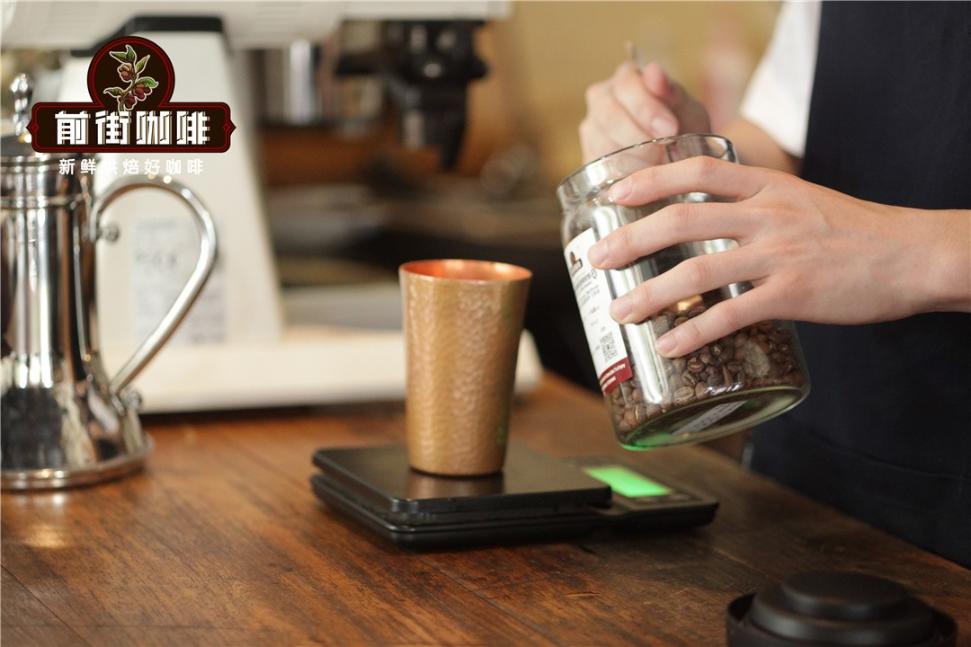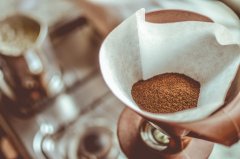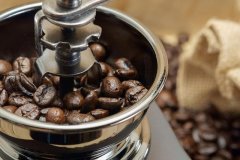Difference of Flavor extraction of Coffee Grinding with different utensils effect of Grinding on Coffee Flavor
After roasting, the cells of raw beans are destroyed and arranged loosely, but the cell wall is full of carbon dioxide, oil and aromatic flavors produced by pyrolysis, and the bean itself expands as a result, but if the whole cooked bean is not ground, it is not easy to release the aroma and water-soluble flavors stored in the cell wall, and it is difficult to make delicious coffee. In order to induce the flavor of the coffee, the coffee beans should be ground into powder before brewing the coffee. Only after grinding and crushing can the hard cell wall be opened, hot water can enter, and the coffee can be extracted.

The coffee you grind (and the way you grind it) is the first step towards influencing how the final taste is brewed. Believe it or not, you can have the best coffee, perfect roasting, pure water, quality filters and excellent coffee maker, but it can still be ruined by incorrect grinding. But don't let your predicament stop you; some basic knowledge of coffee grinding will go a long way to help you make the perfect coffee.
No matter how your coffee is brewed, the basic goal of grinding coffee beans is the same: to break down the roasted beans and expose the inside of the beans in order to extract the flavor. Ground coffee has a much larger surface area than whole bean coffee, so it allows water (extractant) to come into contact with more coffee when brewing. More contact means more flavor extraction and better yield. But this should also be carried out under the premise that it is suitable for coffee beans. For example, the front street of Manning Coffee generally uses the grinding degree of EK43S 11, because the flavor of Manning coffee itself is very rich, and if you use fine grinding degree, the flavor of the whole coffee will be more bitter. Coffee beans from Africa tend to be ground with a finer grinding degree, such as our common Yega Chuefei Coffee. The front street usually uses the 9.5 scale grinding scale of EK43S, in order to better highlight its flower aroma and fruit acid to retain the original flavor of coffee bean plum.
The degree of grinding of coffee is very important no matter what brewing method you use, coffee making involves extracting flavor (and caffeine) from coffee grounds. The finer the coffee beans are ground, the larger the exposed surface area of coffee grounds is and the faster the extraction speed is. This is why the coffee used in the espresso machine is finely ground, because the water in the espresso machine passes through the coffee powder very quickly under high pressure. Cold-extracted coffee, on the other hand, is made from rough coffee, because this cold extraction method allows coffee to stay with water for longer (a few hours, compared with 30 seconds for espresso).
Pay attention.
After the coffee beans are ground, the surface area increases, the contact surface with the air becomes wider and oxidizes rapidly, and the volatile components in the drought coffee powder gradually melt into the air and lose their aroma, so the best grinding time is before brewing coffee.
If you have a coffee grinder at home, you can try different grinding methods to find the best grinding method for you. Before that, Qianjie will introduce four relative standard coffee grindability for reference only.
Very fine grinding
Particle size: like monosodium glutamate
Utensils suitable for cooking: Italian thickener

Fine grinding
Particle size: like monosodium glutamate and sugar
Suitable for cooking utensils: mocha pot, Italian espresso machine
Medium grinding
Particle size: like pepper and sugar
Suitable for brewing utensils: American coffee maker, hand brewing, siphon
Rough grinding
Particle size: like sesame
Suitable utensils for brewing: French pressure kettle and curling kettle

Qianjie believes that there are roughly three factors that affect a cup of coffee.
Degree of grinding: the finer the coffee is ground, the stronger the coffee is, and the thicker the coffee is, the lighter the flavor is.
Cooking time: the longer the cooking time, the stronger the month, the shorter the cooking time, the lighter the cooking time.
Water temperature: the higher the water temperature, the stronger the coffee, the lower the coffee, the lighter the coffee.
If your coffee tastes sour and thin, your coffee beans may be too coarse. Try finer grinding to see if you can solve the problem. If your coffee tastes too bitter, you may grind it too fine. Thicker grinding may improve your brewing effect. (brewing time and temperature also affect flavor. )
So why is thickness so important? Because it directly affects the extraction rate and the concentration of coffee, different beans have their most suitable thickness. In addition to many experiments, it is suggested that you can refer to the perfect extraction rate range of gold cup theory (18% 22%) and the best concentration (1.15% 1.55%). As long as fine-tuning is made in this range, it will not make the flavor of coffee change too much or cause poor taste spectrum, for beginners. It is also easier to make good coffee, so you might as well be more familiar with the right thickness of each bean when you are free. After all, a difference of 0.5 scale will make its flavor different.
Professional coffee knowledge exchange more coffee bean information please follow the coffee workshop (Wechat official account cafe_style)
For more boutique coffee beans, please add private Qianjie coffee on Wechat. WeChat account: kaixinguoguo0925
Important Notice :
前街咖啡 FrontStreet Coffee has moved to new addredd:
FrontStreet Coffee Address: 315,Donghua East Road,GuangZhou
Tel:020 38364473
- Prev

Coffee Grinding and Bean Mill relationship between Coffee Grinding thickness and extraction Speed
Professional coffee knowledge exchange more coffee bean information please pay attention to the coffee workshop (Wechat official account cafe_style) coffee bean grinding fineness how to judge and set the Italian espresso extraction speed: the oxidation rate is proportional to the surface area, and the extraction of substances in coffee is also proportional to the surface area, that is to say, the finer the grinding, the faster the extraction speed.
- Next

The importance of the coffee bean grinder and the degree of grinding it depends on how the coffee is tasted and whether it is good or not
Professional coffee knowledge exchange more coffee bean information please pay attention to the coffee workshop (Wechat official account cafe_style) coffee bean grinding fineness how to judge and set the espresso grind degree to make a good cup of coffee there are many elements, however, the coffee bean grinding fineness is most often ignored! If you don't usually have any research on coffee, you should receive a free bag.
Related
- Beginners will see the "Coffee pull flower" guide!
- What is the difference between ice blog purified milk and ordinary milk coffee?
- Why is the Philippines the largest producer of crops in Liberia?
- For coffee extraction, should the fine powder be retained?
- How does extracted espresso fill pressed powder? How much strength does it take to press the powder?
- How to make jasmine cold extract coffee? Is the jasmine + latte good?
- Will this little toy really make the coffee taste better? How does Lily Drip affect coffee extraction?
- Will the action of slapping the filter cup also affect coffee extraction?
- What's the difference between powder-to-water ratio and powder-to-liquid ratio?
- What is the Ethiopian local species? What does it have to do with Heirloom native species?

